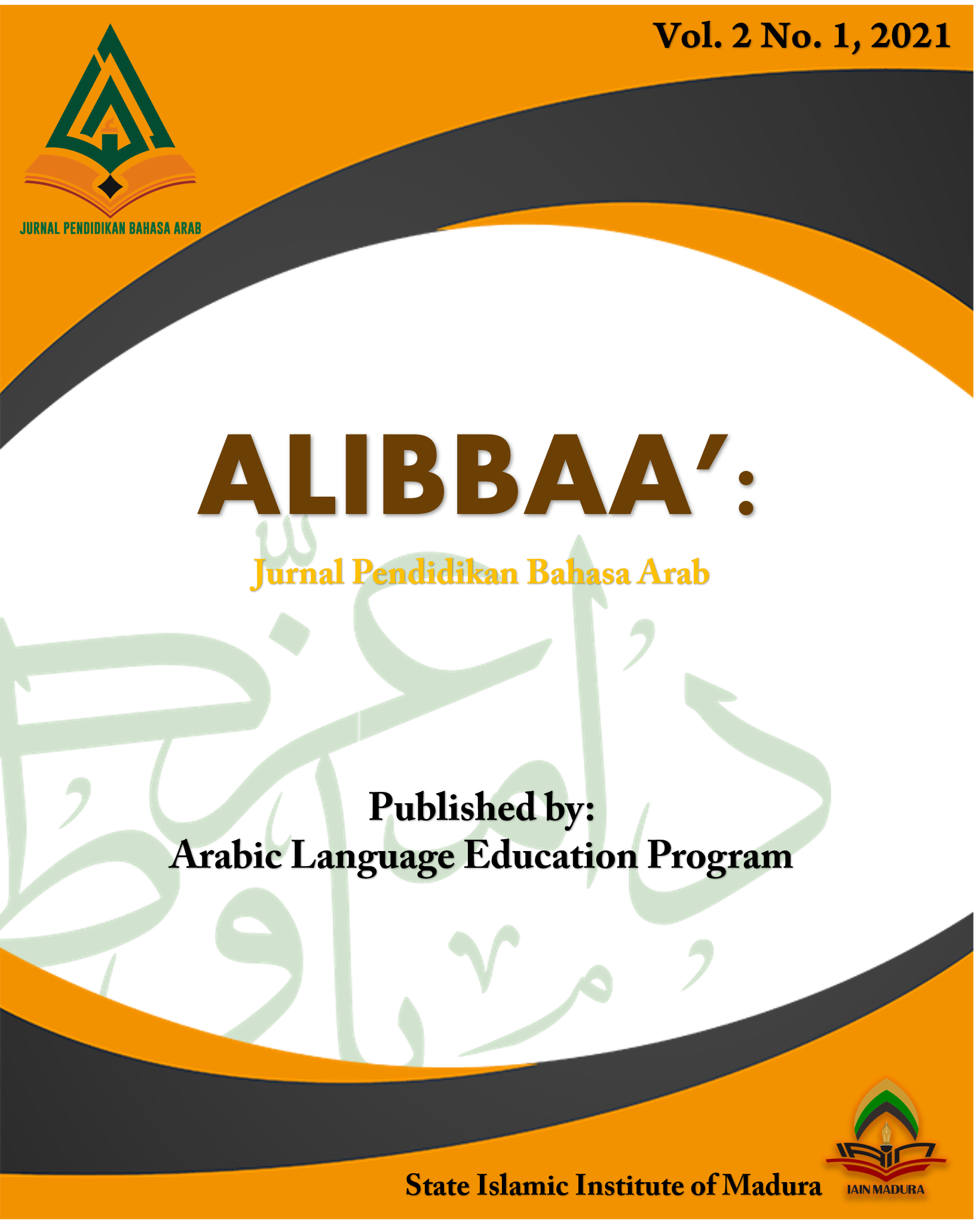Ta'lîmu Ashwâti al-Lughah bi at-Tharîqah al-Tarkîbiyyah al-Tahlîlîyyah li Mahârati al-Istimâ' li al-Thullâb al-Mubtadiîn
 Abstract views: 231
,
Abstract views: 231
,
 PDF downloads: 247
PDF downloads: 247
Abstract
Dar al-Lughah Wa Dirasat al-Islamiyyah Pamekasan Islamic boarding school is an Arabic language development institutions which applies phonetics learning to students at the first grade. Phonetic learning is important in learning Arabic especially for listening skill. Arabic phonetics and listening skill are an inseparable unity. First graders need to learn phonetics to support their listening skills in learning Arabic. At Dar al-Lughah, this is taught using synthetic-analytical methods (al-thariqah al-tarkibiyyah al-tahliliyyah) as it is considered very effective. The results of observations, interviews, questionnaires and document examination through descriptive qualitative methods show that the use of synthetic-analtical method is very suitable for phonetics subject learning among first graders of Dar al-Lughah. Moreover, several media are used. One of with is schematic drawing of the face (rasm al-takhthithi li al-wajhi). However, some problems arise in the process of phonetics learning, including:1) First graders are not accustomed to recite any sounds of Arabic letters, words or sentences in good and right pronounciation.2) First graders find it difficult to harden the tongue in pronouncing some specific sounds of Arabic letters, especially those which do not exist in Indonesian language, 3) Most of first graders come from schools where they were not used to listen to Arabic letter pronunciation from native speakers.
Downloads
References
إبراهيم، احمادة. الإتجاهات المعاصرة فى تدريس اللغة العربية واللغات الحيّة الأخرى لغير الناطقين بها، قاهرة: دار الفكر الغربيّ ، 1987.
إبراهيم، عبد العليم. في طريق التدريس الموجه الفنّى لمدرسى اللغة العربية، مصر: دار المعارف، 1978.
أحمد، محمد عبد القادر. طرق تعليم اللغة العربية ، قاهرة: مكتبة النهضة المصرية، 1979.
إسماعيل، زكريا. طرق تد ريس اللغة العربية، دار المعرفة الجامعية، 1995.
بشر، كمال محمد. علم اللغة العام الأصوات، القاهرة: دار المعارف، 1980.
الحديدي، علي. مشكلة تعليم اللغة العربية لغير العرب، القاهرة: دار الكاتب.
حسن، تمام. اللغة العريبة معناها ومبناها، المصرية الشامة للكتاب، 1979.
خريـمة، الرسالة المدرسة " أهمية اللغة العـربية وطريقة تسلم وتعليمها لغير الناطقين بها "، المدرسة الثانوية الدينية الثقاية الإسلاميّ، 2006.
الخولي، محمد علي. أساليب تدريس اللغة العربية، جميع الحقوق، 1982.
_________ مدخل إلى علم اللغة، الأردن: دار الفلاح، 1993.
الركابي، جوردت. طرق تدريس اللغة العربية، بيروت: دار الفكر المعاصر، 1996.
سليمان، سناء محمد. أدوات جمع البيانات في البحوث النفسية والتربوية، القاهرة: عالم الكتب، 2010.
سليمان، عبد الرحمن سيد. مناهج البحث، عالم الكتب، 2014.
السجل العلمي للندوة العالمية الأولى لتعليم العربية لغيرا الناطقين بها، جامعة الرياض: 1980.
شحاته، حسن. تعليم اللغة العربية بين النظرية والتطبيق، قاهرة: الدار المصرية البنانية، 1992.
صيني، سعيد إسماعيل. قواعد أساسية في البحث العلمي، بيروت: مؤسسة رسالة، 1994.
طعيمة، رشدي أحمد. مناهج تدريس اللغة العربية بالتعليم الأساسي، قاهرة: دار الفكر العربي، 1998.
العربي، صلاح عبد المجيد. تعلم اللغات الحية وتعليمها بين النظرية والتطبيق، بيروت: مكتبة لبنان، 1981.
العزيز، ناصف مصطفى عبد. الألعاب اللغوية في تعليم اللغات الأجنبية، الرياض: دار المريخ، 1983.
عطا، إبراهم محمد. طرق تدريس اللغة العربية والتربية الد ينية (الجزءالأول) ،قاهرة: مكتبة النهضة المصرية، 1996.
الغالي، ناصر عبدالله وعبد الحمد عبدالله. أسس إعداد الكتب التعليمية لغير الناطقين بالعربية، دار الإعتصار، 1991.
الناقة، محمود كامل. تعليم اللغة العربية للناطقين بلغات أخرى، مكة المكرمة: جامعة أم القرى، 1985.
هيوز، إي. إج. التعلم والتعليم، سعود: جامعة الملك، 1975.
وافي، على عبدا الواحد. علم اللغة، قاهرة: مكتبة نهضة مصر، 1962.
يونس، فتحى علي. تصميم منهج لتعليم اللغة العربية للأجانب، قاهرة: دار الثقافة، 1978.
Bloomfield, Lenardo. Bahasa, Jakarta: PT. Gramedia Pustaka Utama, 1995.
Chaer, Abdul. Linguistik Umum, Jakarta: PT. Asdi Mahasatya , 2003.
Djajasudarma, Fatimah. Metode Linguistik “Ancangan Metode Penelitian dan Kajian”, Bandung: Rafika Aditama, 2006.
Lyons, John. Pengantar Teori Linguistik, PT. Gramedia Pustaka Utama, 1995.
Marsono. Fonetik, Yogyakarta: UGM Press, 1999.
Muslich, Masnur. Fonologi Bahasa Indonesia, Jakarta: Bumi Aksara,2009.
Samsuri. Analisis Bahasa, Jakarta: Erlangga, 1994.
Sudaryanto, Lingusitik, Yogyakarta: UGM Press, 1985.
Suja'i, Inovasi Pembelajaran Bahasa Arab, Semarang: Walisongo Press,2008.
Titone, Renzo, Marcel Danesi. Aplied Psycholinguistics: An Introduction to the Psychology of Language Learning and Teaching, London: University of Toronto Press,1946.
Verhaar: JWM. Asas-Asas Linguistik, Yogyakarta: UGM Press, 2004.
Authors who publish with this journal agree to the following terms:
a. Authors retain copyright and grant the journal right of first publication with the work simultaneously licensed under a Creative Commons Attribution License that allows others to share the work with an acknowledgement of the work's authorship and initial publication in this journal.
b. Authors are able to enter into separate, additional contractual arrangements for the non-exclusive distribution of the journal's published version of the work (e.g., post it to an institutional repository or publish it in a book), with an acknowledgement of its initial publication in this journal.
c. Authors are permitted and encouraged to post their work online (e.g., in institutional repositories or on their website) prior to and during the submission process, as it can lead to productive exchanges, as well as earlier and greater citation of published work (See The Effect of Open Access).
Alibbaa': Jurnal Pendidikan Bahasa Arab have CC-BY-SA or an equivalent license as the optimal license for the publication, distribution, use, and reuse of scholarly work.
In developing strategy and setting priorities, Alibbaa': Jurnal Pendidikan Bahasa Arab recognize that free access is better than priced access, libre access is better than free access, and libre under CC-BY-SA or the equivalent is better than libre under more restrictive open licenses. We should achieve what we can when we can. We should not delay achieving free in order to achieve libre, and we should not stop with free when we can achieve libre.

Alibbaa': Jurnal Pendidikan Bahasa Arab is licensed under a Creative Commons Attribution 4.0 International License
You are free to:
- Share — copy and redistribute the material in any medium or format
- Adapt — remix, transform, and build upon the material for any purpose, even commercially.
- The licensor cannot revoke these freedoms as long as you follow the license terms.











